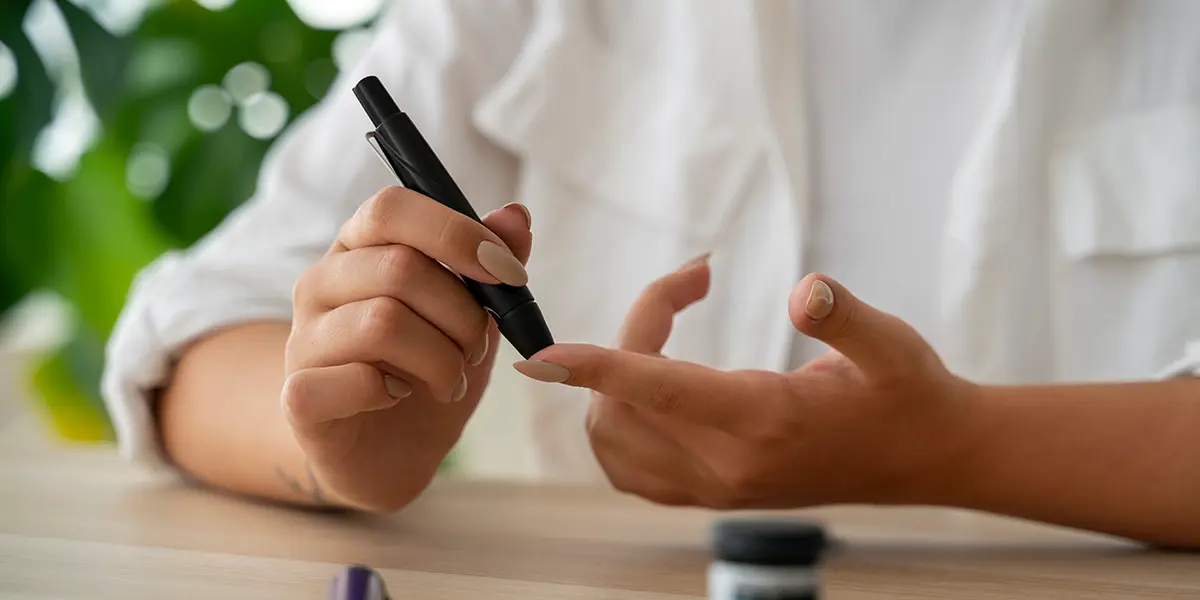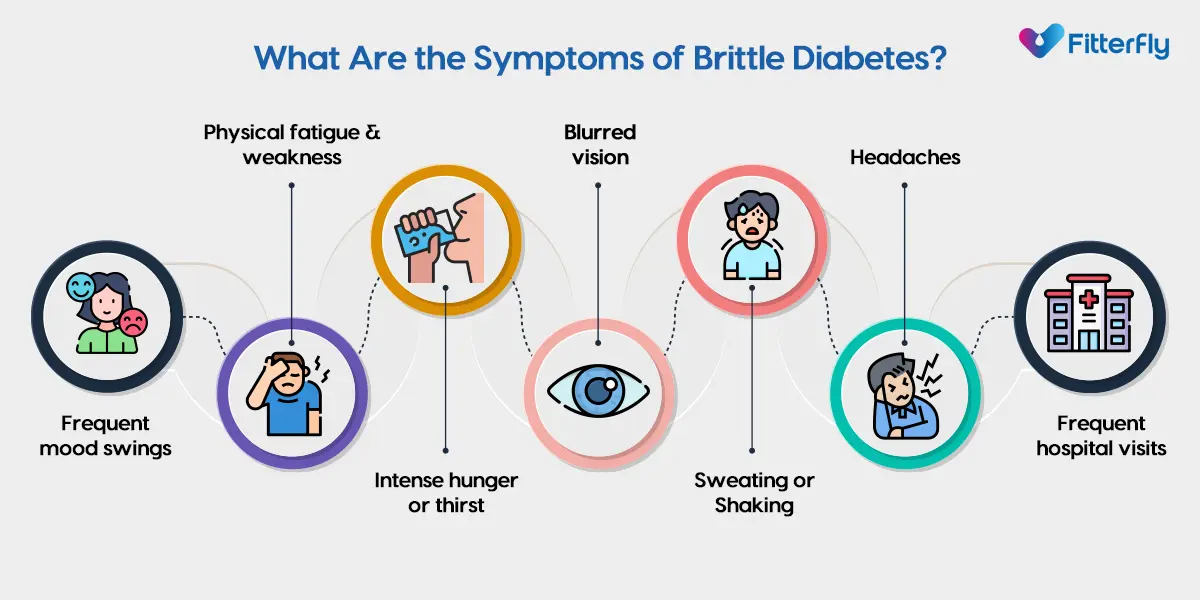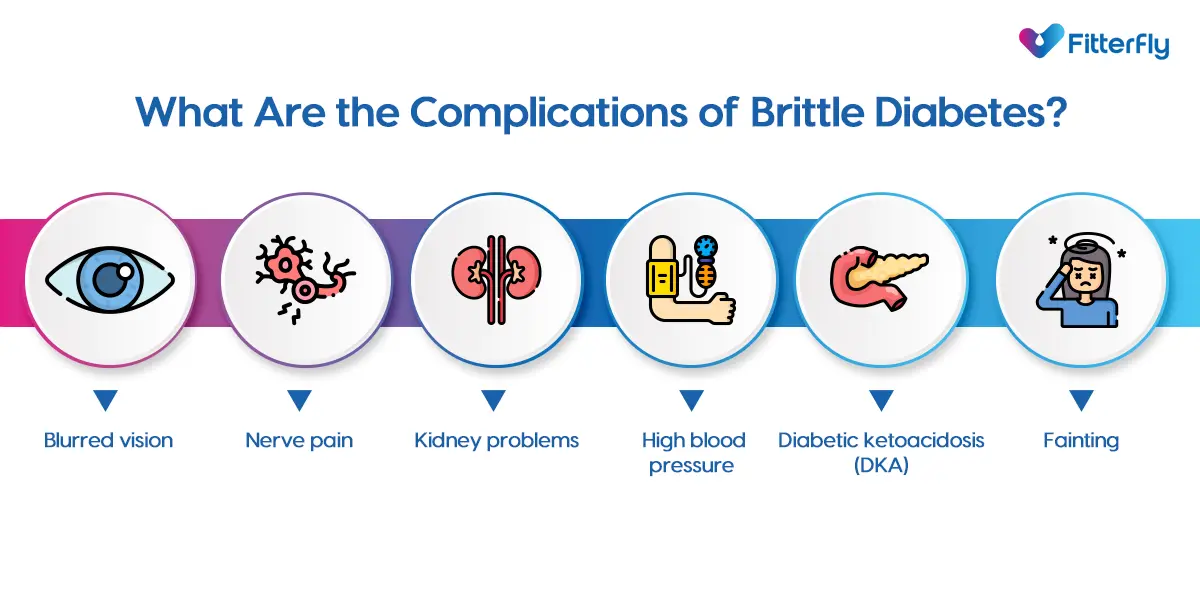What is Brittle Diabetes?

Most of us are familiar with diabetes, whether personally or through loved ones. But have you ever heard of brittle diabetes?
This lesser-known form of diabetes is unique and can be incredibly challenging to manage. While it shares similarities with other types, brittle diabetes stands out due to its unpredictability and extreme blood sugar swings.
But before understanding brittle diabetes, let’s take a step back and understand what diabetes is exactly.
What is Diabetes?
Diabetes is a chronic condition where the body struggles to regulate blood sugar (glucose) levels effectively. This can happen either due to the body not producing enough insulin, as in type 1 diabetes, or due to insulin resistance, as in type 2 diabetes.
Both types result in high blood sugar levels, which can lead to various health complications over time. Managing diabetes generally involves a combination of medication, lifestyle adjustments, and regular monitoring.
Now that you know what diabetes is, let’s move on to understand more about brittle diabetes.
What is Brittle Diabetes?
Brittle diabetes, sometimes referred to as labile or unstable diabetes, is a rare form of diabetes condition where blood sugar levels fluctuate drastically and unpredictably. Unlike typical diabetes, where blood glucose levels can be managed with regular monitoring and treatment, brittle diabetes involves extreme highs (hyperglycemia) and lows (hypoglycemia) that are difficult to control and often occur without clear patterns.
This condition mainly affects people with type 1 diabetes and often needs additional attention, care, and medical support. Brittle diabetes can be challenging to manage because of its unpredictable blood sugar changes.
Let’s understand what causes brittle diabetes.
To know your chances of Diabetes reversal, take the Diabetes Reversal TestDiabetes Reversal
Calculator
What Causes Brittle Diabetes?
Brittle diabetes can have many causes, including other health conditions, diabetes itself, and complications related to diabetes.
- Digestive Issues
- High levels of stress, anxiety, or emotional ups and downs
- Hormonal Changes
- Problems with Insulin Absorption
Now you know the causes, but how can one identify that it’s not typical diabetes? While some symptoms overlap with common diabetes signs, how can you tell if it’s something more, like brittle diabetes?
What Are the Symptoms of Brittle Diabetes?

Here are some common symptoms that may suggest brittle diabetes; these symptoms are similar to those experienced in diabetes:
- Frequent mood swings
- Physical fatigue & weakness
- Intense hunger or thirst
- Blurred vision
- Sweating or Shaking
- Headaches
- Frequent hospital visits due to frequent blood sugar fluctuations
What Are the Complications of Brittle Diabetes?


Brittle diabetes may not cause different complications from typical diabetes but can lead to similar issues. Here are some of the most common and relatable complications:
- Eye problems like blurred vision.
- Nerve pain and numbness (Neuropathic Pain) like tingling and pain in hands & feet.
- Kidney problems
- Heart issues like high blood pressure.
- Diabetic ketoacidosis (DKA)
- Severe low blood sugar (Hypoglycemia) symptoms like dizziness, confusion, or fainting.
Who is at Risk for Brittle Diabetes?
Brittle diabetes doesn’t affect everyone with diabetes, but certain conditions can make some people more prone to it. Here are some key factors that increase the likelihood of experiencing brittle diabetes:
- Long-term type 1 diabetes
- Difficulty managing blood sugar levels
- Ongoing stress or mental health issues
- Frequent blood sugar spikes
How is Brittle Diabetes Diagnosed?
Diagnosing brittle diabetes goes beyond routine check-ups; a thorough clinical diagnosis is essential. It’s important to consult your doctor rather than attempting to self-diagnose or treat, as they will look for recurring patterns of extreme highs and lows that are difficult to control.
Here are common tests that your doctor may ask to diagnose brittle diabetes:
- Medical History Review: Doctors examine the duration of diabetes, past blood sugar patterns, and any previous hospital visits or episodes of extreme fluctuations to assess frequency and severity.
- Blood Glucose Pattern: A Continuous Glucose Monitor (CGM) tracks blood sugar levels around the clock, providing a complete picture of blood sugar trends and identifying frequent, unpredictable swings.
- HbA1C Test: The A1C test shows average blood sugar levels over recent months, offering an overview of long-term blood sugar control.
- Checking for Other Health Conditions: Health issues such as digestive problems or hormonal imbalances may impact blood sugar stability. Doctors may investigate these factors to address potential root causes of instability.
Once a diagnosis is made, managing brittle diabetes requires a careful and personalized approach.
Remember, your doctor is the best person to guide your treatment plan, so avoid self-medication and follow your doctor’s advice closely. They may suggest practical ways to help keep blood sugar levels steady and manage the unpredictable swings that come with brittle diabetes.
Reduced diabetes medications in 3 months


6.8%
Happy members
EMI
Guarantee
4.8/5
Diabetes Prime Program
How is Brittle Diabetes Treated?
Prevention is always better than cure. Make sure to visit your doctor regularly and keep up with monitoring.
Treating brittle diabetes often involves small adjustments that can fit easily into your daily routine. Here are some common suggestions your doctor might make:
1. Regular Meal Times
Eating meals at similar times each day can help keep blood sugar stable. For example, if you typically eat lunch around noon, sticking to this schedule can help your body handle food better and avoid sudden sugar spikes or drops.
2. Managing Stress
Stress can cause blood sugar swings, so finding simple ways to relax can make a difference. Taking a few minutes to breathe deeply, going for a quick walk, or even spending a few moments with a relaxing hobby can help keep stress levels low and blood sugar more stable.
3. Staying Active
Regular physical activity, like a daily walk, light stretching, or a short yoga session, can support blood sugar control. Even simple activities around the house, like gardening or cleaning, can help keep blood sugar balanced.
4. Good Sleep Routine
Quality sleep supports blood sugar regulation. Going to bed at a regular time, reducing screen time before sleep, and creating a calming bedtime routine, like reading or listening to soft music, can improve sleep quality.
5. Regular Check-ins with Your Doctor
Staying in touch with your doctor helps ensure your treatment plan is effective. They may adjust your medications, suggest small changes in your routine, or give additional advice based on your specific needs.
How Can You Manage & Reduce the Risk of Brittle Diabetes?
Brittle diabetes may not always be preventable, but with these practical steps, you can better manage it and reduce severe blood sugar fluctuations:
- Maintain a Consistent Routine: Stick to regular mealtimes, sleep, and activity schedules. Eating breakfast, lunch, and dinner around the same time daily can help stabilize blood sugar.
- Prepare Balanced Meals: Include protein, whole grains, and vegetables to avoid sudden spikes. Simple, balanced meals like oats with nuts in the morning or rice with lentils and vegetables at lunch work well.
- Have Healthy Snacks Handy: Keep snacks like nuts, curd/dahi, or fruit nearby to prevent sudden drops between meals, especially on busy days.
- Practice Relaxation Techniques: Deep breathing, stretching, or a short walk can help manage stress, which in turn supports blood sugar control.
- Stay Active in Small Ways: You don’t need intense workouts—light activities like walking after meals, household chores, or stretching throughout the day can keep blood sugar steady.
- Plan for “High and Low” Days: Keep items like glucose tablets or snacks on hand for low blood sugar moments. A backup plan can help manage swings before they escalate.
- Limit Fried and Sugary Foods: Reducing foods like samosas, sweets, or sugary drinks can prevent rapid spikes. Opt for healthier alternatives like fruit snacks, salad, nuts and seeds, or curd/dahi.
- Reduce Screen Time: Avoid excessive screen time, particularly before bed. Taking breaks helps lower stress, especially from intense content like news.
- Spend Time with Loved Ones: Socializing with friends and family can improve mood, reduce stress, and positively impact blood sugar.
- Pursue Hobbies: Enjoying hobbies like painting or gardening can reduce stress and help stabilize blood sugar.
- Track Your Progress: Use a notebook or app to record blood sugar levels, meals, and symptoms. This can help you identify patterns and keep your doctor updated.
How We At Fitterfly Can Help You?
Due to its unpredictable nature, managing brittle diabetes can feel overwhelming, but at Fitterfly, we provide the guidance and support you need for better control and stability. Our expert diabetologist, Dr Vidya Jayadeep Walinjkar, always emphasizes that prevention is better than cure and that adopting an active lifestyle—just like a active and playful kid—is essential to help prevent challenging conditions like brittle diabetes.
Our Diabetes Program offers personalized, compassionate support from a team of coaches. Our Nutrition Coach works with you to design meal plans tailored to your unique needs, focusing on foods that support stable blood sugar levels while minimizing fluctuations.
Our Fitness Coach helps you incorporate gentle, effective exercises into your daily routine, improving blood sugar regulation without adding stress. Not only that, our Success Coach is here to keep you motivated, helping you navigate daily challenges and celebrate small wins along the way.
Call us at 08068507599, and speak to our program advisors to understand your condition better.
This blog provides general information for educational and informational purposes only and shouldn't be seen as professional advice.
Frequently Asked Questions
What is a normal A1C for someone with brittle diabetes?
A normal A1C level for someone with brittle diabetes can vary, as frequent fluctuations make it difficult to maintain a stable average. Generally, the goal is to keep A1C as close to 7% as possible, but your doctor can give personalized advice based on your specific needs.
Is brittle diabetes the same as regular diabetes?
Brittle diabetes is unpredictable form of diabetes, typically affecting those with type 1 diabetes. It involves extreme blood sugar swings that are hard to control and often require extra medical support.
Can brittle diabetes occur at any age?
Brittle diabetes is most common in people who have had type 1 diabetes for several years, although it can potentially occur at any age.
Is brittle diabetes reversible?
Brittle diabetes is not entirely reversible, but with proper management, support, and lifestyle changes, it’s possible to reduce severe blood sugar swings and improve stability.




















